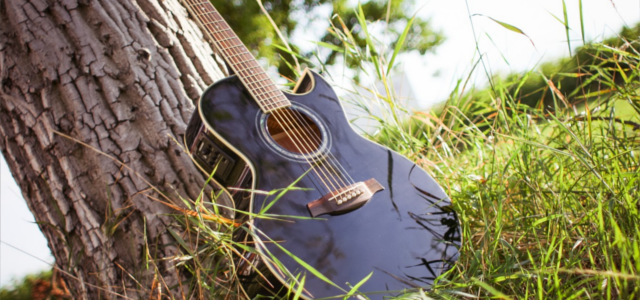First Published In The Music & Sound Retailer’s July 2007 Issue.
Manufacturers look to make eco-friendly guitars
With an eye on perhaps an eroding environment, a group of manufacturers are producing or looking to make eco-friendly guitars. Eco-friendly products have taken several other industries by storm, including automobiles, utilities, and a gargantuan effort to design eco-friendly buildings. In MI, Taylor, C.F. Martin, First Act, Gibson, and others are involved in eco-friendly projects.
Nazareth, Pa.-based Martin Guitar is a charter member of The Good Wood Alliance, comprising woodworkers who work to protect the forest ecosystem to benefit this generation and future ones. The 174-year-old company has researched wood substitutes, which has yielded new acoustic guitars made from domestic woods such as ash, maple, walnut, cherry and koa, Engelmann spruce, larch, and Western red cedar. Martin refuses requests for guitars made from any endangered animal species. Woods used are not 100 percent sustainable, but according to Dick Boak, Martin’s director of public and artist relations, “the company is trying to be proactive,” and “this is a great start.”
Although using rare woods is not dangerous per se, the impact on the environment can be enormous, said Boak. “[As an example], there’s an initiative going on in Alaska now. One of the areas in the Tongas National Forest has been tremendously overharvested to the extent that instead of a sustainable situation, if they don’t take action quickly, they are looking at diminishing resources in a very short amount of time, due to irresponsible wood management practices. So we’re working with Greenpeace to preserve to exert the right constructive pressure in Alaska to preserve a sustainable resource.”
But that leaves one question: Do alternative woods sound good? Despite tremendous ecological efforts, if a substitute doesn’t sound good when your customer plays it, it’s unlikely they will buy it. “We test just about every species of wood that’s even remotely appropriate with guitars and have had tremendous success with that,” said Boak. “There’s no question it’s hard to beat Adirondack spruce and Brazilian rosewood. But we offer lots of different tone woods. The sustainable wood series guitars sound great. Our goal is to produce great-sounding guitars, period. Purists might see slight tonal differences. But that would fall into the category of slightly different character of sound. The sounds definitely don’t suffer at all though.”
First Act has been asked by an artist to create an eco-friendly guitar and the company also believes it can make guitars that offers excellent sound. “That’s a custom shop guitar we’re building for Adam Gardner,” said Jeff Walker, vice president of marketing for First Act. “He’s a member of Guster. He started a charity with his wife called Reverb. The organization works with bands and musicians within the music community. He approached us about manufacturing an eco-friendly guitar. We’re in the process of building that now and it includes special woods and recycled parts. There’s a possibility we might incorporate elements of that into future designs. But for right now, it is a one-time situation for an endorsee of ours.”
Boak admitted it’s difficult to see an environmental impact resulting from eco-friendly efforts yet. However, “you’ve got to start somewhere,” he said. “We have a ton of initiatives going on. And we’re committed to this on many levels. That includes a requirement for all of our dealers to participate in the program. In the dealer contracts, we require each dealer to order and stock sustainable wood models.”
So what new green efforts will we see in the near future? “There are so many things,” said Boak. “In addition to the sustainable wood program, which were trying to add SKUs to on a regular basis, one of the major initiatives is for alternative choices to solid woods. A pretty significant number of our guitars—about 30 percent—are offered with high-pressure laminates, aluminum tops, or graphite. This takes a considerable amount of pressure off of the more precious wood resource. And the beginner or beginner-intermediate player is not only happy with the price, but the tonality of the high-pressure laminate guitars. [Sales of] those guitars started off slowly, but have caught on and now represent a significant number of guitars in our line. If we only offered solid-wood guitars, there would be a considerably higher impact on wood usage.”
Boak added that musicians can be a great help as they are often environmentally-friendly people. But unfortunately, “That doesn’t always hold true when it comes to them buying guitars though. So we’re trying to educate musicians and put them in a more conscientious position about this topic.”
Sierra Guitars, distributed by Musicorp, is also a part of the eco-friendly movement.
“Sierra is an environmentally conscious guitar brand that supports eco-friendly causes by incorporating recycled paper in its packaging, hangtags, soundhole labels, catalogs and manuals,” said Dan Mahoney, President of Musicorp. “Sierra’s use of all-natural wood bindings and soundhole inlays, along with the use of a thinner finish coat which reduces the amount of spray into the environment, promotes a more natural looking guitar with a more natural resonation and sound.”
To learn more about these green efforts, visit the Forest Stewardship Council’s Web site at www.fscus.org or the SmartWood program Web site at www.smartwood.com.



